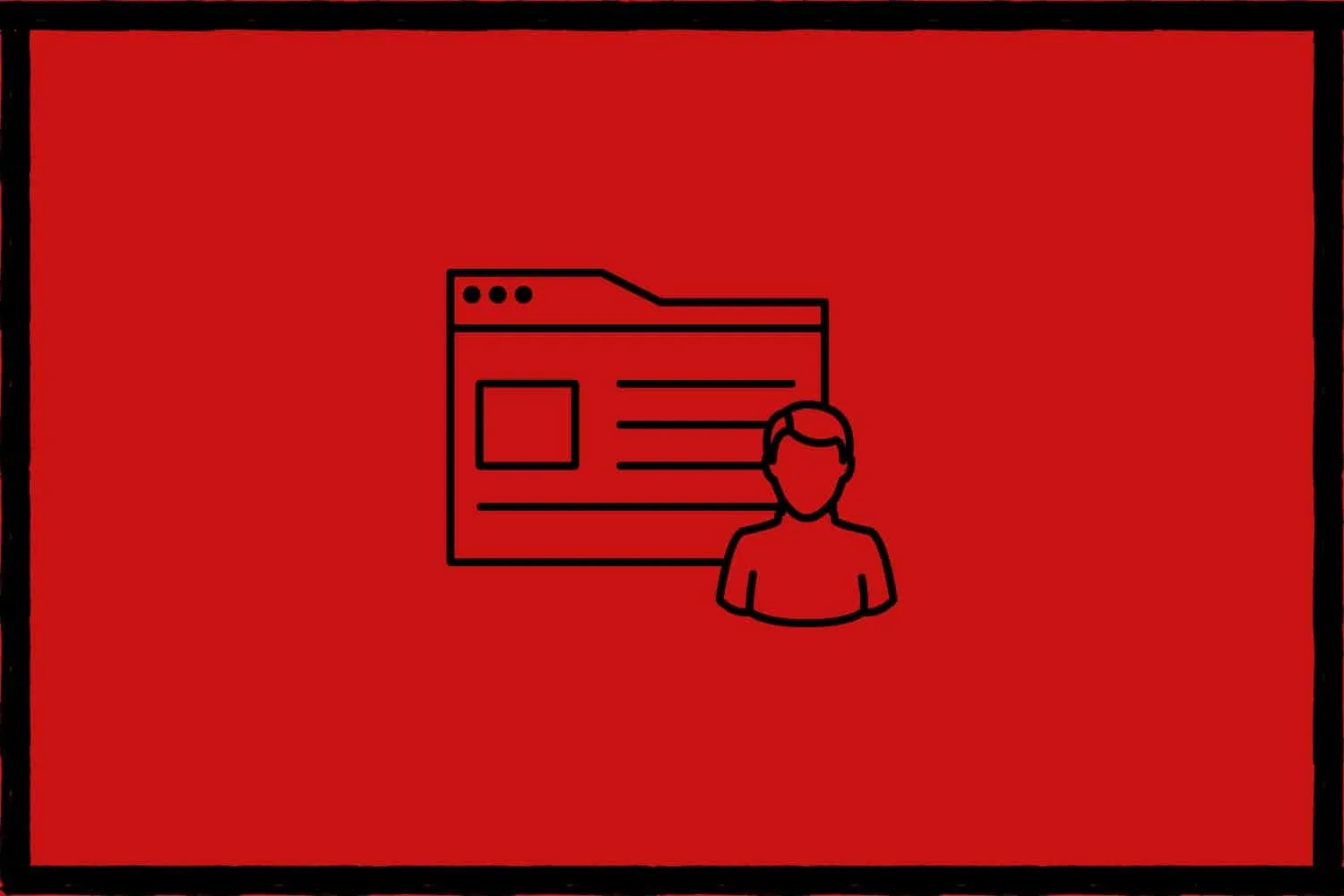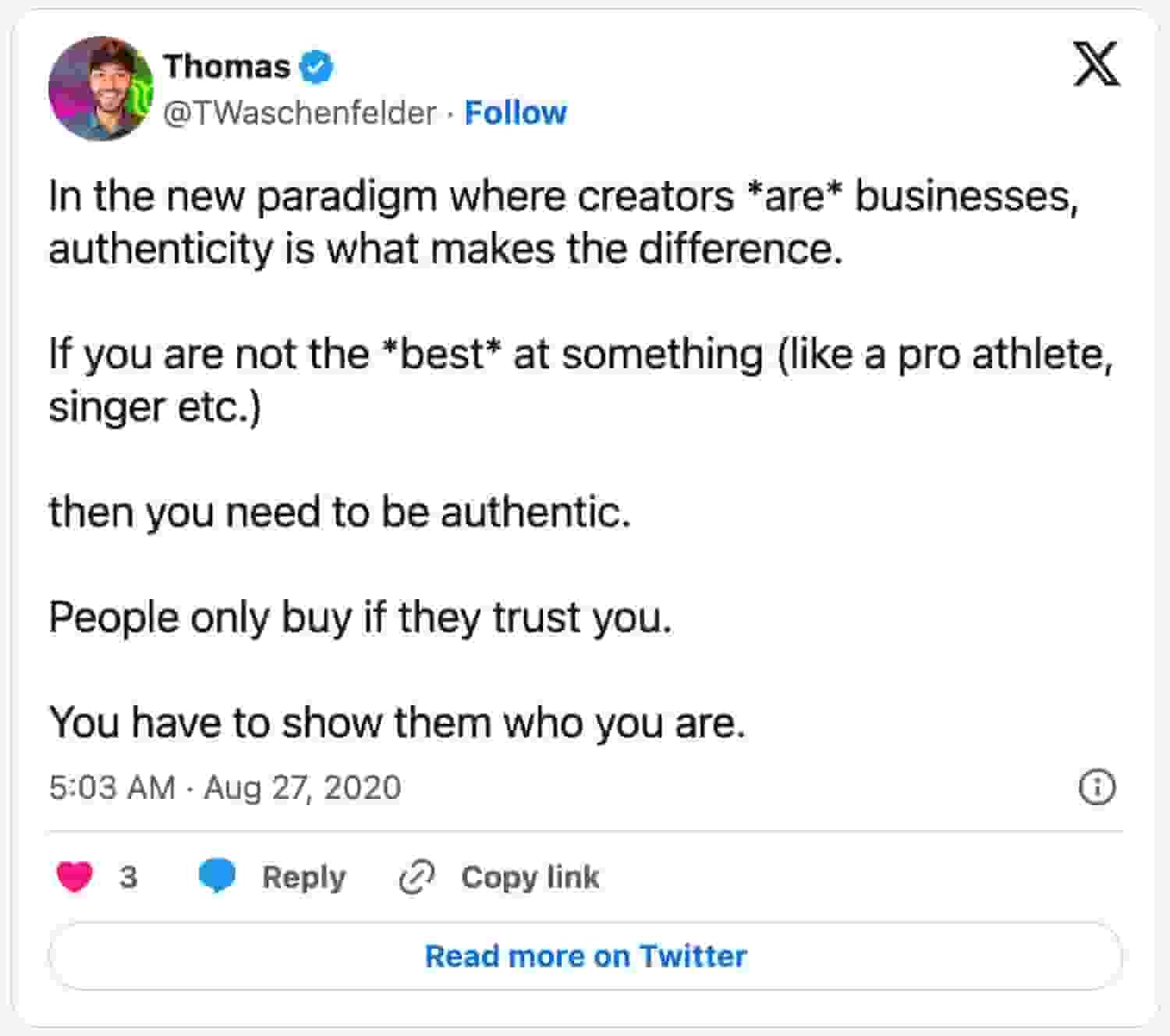Here’s The Secret To Becoming A Solopreneur: Authenticity
“Embrace accountability and take business risks under your own name. Society will reward you with responsibility, equity, and leverage.”
The internet gives everyone with a WiFi connection the opportunity to catapult themselves into soloprenuers (solo + entrepreneurs).
These are creators who leverage ever-cheaper software, digital infrastructure, and creative tools to build monster businesses on the backs of their audiences.
The most critical part of building a solopreneur business is authenticity. People will ONLY buy from you if they trust you. And authenticity is the backbone of trust.
Here’s what authenticity will do for you:
Improve conversion rates on your site.
Help drive insane awareness for your product.
Transform casual fans into rabid consumers.
Escape competition with your product via specificity.
Maintain your integrity while making profits.
Authenticity Means Infusing Yourself Into Your Product.
I recently had a new connection, Andres (@PineiroCoen), review Wealest.com - my product - and provide feedback. The conversation was a game-changer, and one observation struck me like a hammer:
There wasn't enough of ME and MY PROCESS infused into the site.
And he's right. When I started Wealest.com, I wrote anonymously. This made it impossible to be authentic and transparent in what I was trying to build.
I've also been embarrassed about my process. Here's what I mean:
I run a site about the ideas of wealth creators, and yet I am not wealthy! I'm not a financial planner or an investment adviser. I'm just an average guy who gets up every morning to go to work and try and get better.
What gives me the right to write about wealth creation!?
What Andre dropped on me is that there is incredible value in my process. The transformation from learning, applying, and seeing the results of these ideas is valuable to the reader. This is true even if none of us have achieved our desired "result."
So, I've reworked the home page to reflect my journey. It now conveys how freaking proud I am of everything I've learned while building Wealest.
Here's what it looks like now:
Since this change, I’ve seen a near-immediate increase in newsletter sign-ups. These subs help to compound readership, future customers, and eventually my wealth.
Don’t be surprised if you see a similar impact on your conversions if you do the same.
As a creator or soloprenuer, authenticity means putting yourself into your product. This is important because…
Authenticity Builds Trust Between You And Your Future Customer.
For a customer to invest their hard-earned money into something you’ve built, they MUST trust you completely. That’s what authenticity and transparency create: trust between you and your consumer.
Authenticity makes it feel like your reader / viewer / consumer knows you. They understand your point of view and the value of your position. They can see you crisply in their mind’s eye, hunched over a computer in the dark for 12-hours at a time, building something useful just for them.
And then, when you release a product that solves their problem, they’ll buy it from you because they trust you.
Sure, your audience could get the product from somewhere else. They may even get a better product somewhere else. But they trust you, and you’ve earned their money.
Naval Ravikant: Take Business Risks Under Your Name.
Authenticity implies taking business risks under your name. Naval Ravikant writes about this idea in his blog, Embrace Accountability to Get Leverage:
Embrace accountability and take business risks under your own name. Society will reward you with responsibility, equity, and leverage…people who are stamping their names on things aren’t foolish. They’re just confident… These people can get rich just off their name because their name is such powerful branding.
Yes, you can still be an anonymous business owner if you want (there are many of them on Twitter). But, I’ve chosen to build under my name in the long run to get responsibility, equity, and leverage.
Finding Your Authentic Voice Takes Time.
It takes trial and error and practice to be authentic and still provide hyper-value to your consumer.
Be patient and test tons of different styles. Your gut will tell you what feels authentic, while your data and consumer feedback will tell you what resonates.
Dave Portnoy (@stoolpresidente, pictured above) is an interesting case study. He’s the founder of Barstool Sports.
I don’t know Portnoy or pretend to know him, but he seems to be “playing” a larger than life version of himself in the media he creates. He reminds me of Larry David’s character in Curb Your Enthusiasm.
Portnoy’s audience loves him. He’s found a balance between creating a product his audience wants and infusing his personality into that product to make it authentic to him.
Plus, he knows precisely which medium he kills - video content.
When You Choose A Medium Of Expression, Play To Your Strengths.
Portnoy knows that he excels with video and pounds away at it. Whether it’s Twitter, YouTube, or TikTok - his videos are everywhere.
Here’s a video of him analyzing the squawk a seagull makes (it’s pretty funny, actually).
Portnoy is playing to his strengths.
Naval Ravikant does the same. He’s a brilliant speaker, so he uses podcasts as his prime medium of expression, along with a blog with those podcast episodes transcribed. Here’s an example:
I write as my main form of expression because it’s something I’m good at, and I love to do. I’m planning on branching out into podcasts and videos as well, but if those don’t work, I always have my beloved English word to fall back on.
When you’re deciding which medium to create in, start with something you’re already good at.
If you’re a great designer, design.
If you’re a great writer, write.
If you’re great on camera, make videos.
Play to your strengths. Your audience will let you know whether it’s working with their engagement.
And if it’s not working, try another medium!
Naval Ravikant: Escape Competition Through Authenticity.
Naval tells us that when you create something from your unique perspective, you escape competition because there’s no one in the world building the same thing you are. He writes on his blog:
If you are building and marketing something that’s an extension of who you are, no one can compete with you. Who’s going to compete with Joe Rogan or Scott Adams? It’s impossible. Is somebody else going write a better Dilbert? No. Is someone going to compete with Bill Watterson and create a better Calvin and Hobbes? No.
Icons like Joe Rogan and Scott Adams have carved out a specialized skill stack. This is a unique set of skills that they stack on top of each to become extremely specialized (and unforgettable).
Scott Adams combines his understanding of psychology and business with his drawing skills to create Dilbert.
Gordon Ramsay, as another example, stacks his cooking skills with an abrasive communication style to build a reality TV empire.
To craft your skill stack, first identify your best skills and interests. Then find a unique way to stack them onto one another to get even more specialized. This will help you to escape competition through authenticity.
Authenticity Means You’re Willing To Get Rejected.
Being authentic and infusing yourself into your product means you’re going to piss some people off, or at least drive some people away. And that’s okay.
Nassim Nicholas Taleb, in his book, The Black Swan, tells the story of a fictional scientist, Yevgenia Nikolayevna Krasnova, who is trying to get her book published while sticking to her authentic product. Taleb writes:
Publishers were confused by her manuscript. She could not even answer their first question: “Is this fiction or nonfiction?” Nor could she respond to the “Who is this book written for?” on the publishers’ book proposal forms. She was told, “You need to understand who your audience is” and “amateurs write for themselves, professionals write for others.” She was also told to conform to a precise genre because “bookstores do not like to be confused and need to know where to place a book on the shelves.”
Krasnova eventually self-publishes her manuscript on the internet. It slowly gains traction, and then explodes, selling millions of copies worldwide. The point of the story is to illustrate this as a positive Black Swan event.
But the story also represents what it means to be authentic to your product. Even though one “important” person doesn’t like what you’ve created, with a little luck, there could be thousands or even millions of consumers who do.
Your job is to stick with it long enough to find out.
Keep going.
You Still Need A Great Product That Helps People.
You’re probably thinking: “That’s all fine and good to make something you like, but it still needs to sell!”
And you’re right. No matter how authentic the product, it still needs to solve a problem for someone.
Naval Ravikant writes:
Authenticity naturally gets you away from competition. Does it mean that you want to be authentic to the point where there’s no product-market fit? It may turn out that you’re the best juggler on a unicycle. But maybe there isn’t much of a market for that, even with YouTube videos. So you have to adjust until you find product-market fit.
You need to strike a perfect balance between authenticity and demand for the thing you’re building.
Build A Product Authentic To You.
No matter what you’re building, find a way to infuse your personality into it. Some people may hate it, but who cares when you have a rabid fan base who trusts you enough to give you their money.
Start now.
If You Want More Ideas Like This, Follow Me On Twitter And Subscribe To My Newsletter:
—
Taleb, Nassim Nicholas. The Black Swan: Second Edition: The Impact of the Highly Improbable (Incerto). Random House Publishing Group. Kindle Edition.
Naval Ravikant’s Blog: How To Get Rich: All Episodes





